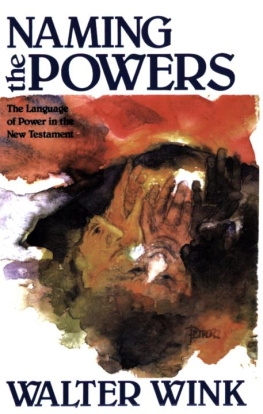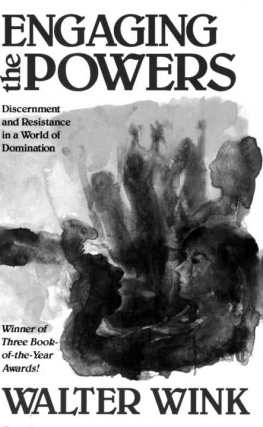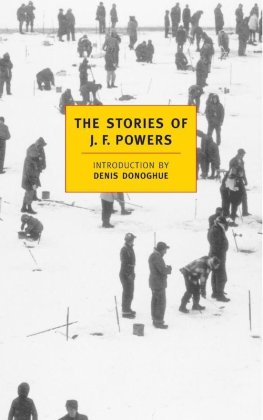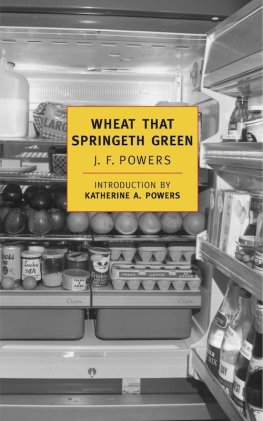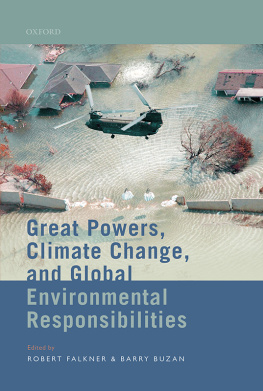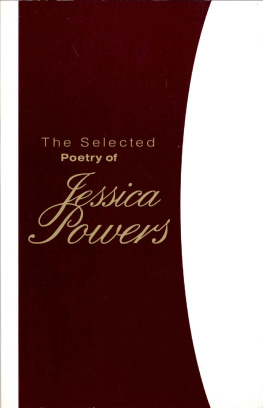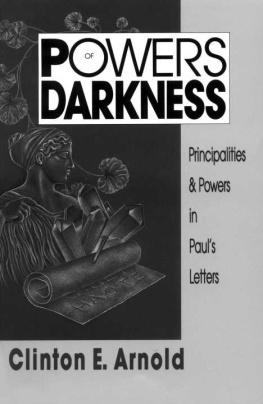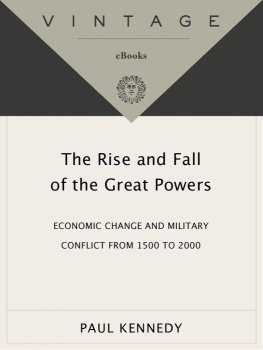
BY WALTER WINK




WALTER WINK





ix
xiii
I
Identifying the Powers
The Disputed Passages
Interpreting the Powers
This book was not intended. I had almost finished what is now one of its companion volumes and had gone to Latin America on a sabbatical leave, hoping to complete the writing while experiencing life under military dictatorship. During that four-month leave, most of it spent in Chile but also including Argentina, Brazil, Bolivia, Peru, Costa Rica, and Nicaragua, my wife June and I observed the churches' responses to human rights violations and hunger. We stayed in barrios and favelas, talking with priests and nuns struggling with the everyday crush of oppression. We interviewed a lawyer who represented the families of people who had "disappeared." We spent an excruciating evening in dialogue with a woman who had been tortured.
This kind of exposure went on week after week. Finally I had had more than I could stomach. Instead of expressing the pain of so much evil in tears, I tried to stop the avalanche. I wanted simply to escape it. I became angry with the oppressors, angry with the oppressed, unaware of the grief tearing at my heart.
At the end of the trip I became M. I had planned to spend the last bit of unbroken time writing, but now I was so weak and underweight that I could scarcely function. Worse, I was overwhelmed by despair. I had gone to Latin America hoping that what we experienced there would help me write a book that could make a difference. The evils we encountered were so monolithic, so massively supported by our own government, in some cases so anchored in a long history of tyranny, that it scarcely seemed that anything could make a difference.
Since I was unable to mobilize my energies for creative writing, I started working through a book that had come out while we were gone: Wesley Carr's Angels and Principalities (1981). It was largely in error, I felt, but it was persuasively argued. I could at least rally for a book review. That written, I still felt unsatisfied. Perhaps an article would be better. When that exceeded fifty pages and was scarcely begun, I realized that I simply had to jettison my own itinerary and run with the wind.
What Carr had done was force me to abandon the relative consensus that I thought existed on the issue of the Powers and to reexamine every scrap of evidence from scratch. That kind of detailed work was good therapy for someone who still had not cried. It was like assembling a telephone book. For three days I would look up all the references to a single word in Philo or Josephus, then write perhaps a sentence. I am an impatient person; in good health I would never have submitted to such tedium. I was-how shall I put this-tricked into it.
Then one day, after plowing through all the data (Part One) and having completed virtually all the exegesis (Part Two), suddenly, just the way the books on scientific method say it is supposed to happen, the mass of data crystallized into a simple pattern. For the first time I sensed that I understood what the biblical language of power was about. Often our research begins with a clear hypothesis that we test by research; there was something elating about having the hypothesis emerge from the research.
During all this time I had also been struggling with my despair. How could the writers of the New Testament insist that Christ is somehow, even in the midst of evil, sovereign over the Powers? I wrestled with this assertion with all my might. Gradually an answer began to shape itself. What I found may not strike anyone else as amounting to much, but for me it was the thin margin of hope, and I clung to it desperately.
And somewhere in the midst of the writing and the wrestling, I was given the gift of my tears.
Perhaps it may seem strange to say now, but I am profoundly grateful for all that: to Carr for writing a book that, however wrong, forced me to a task I would never have taken up voluntarily; for the despair, since I have tried to avoid it all my life-now I know it can be endured; also for June, who suffered with me through all that and a great deal more, and to whom this book is lovingly dedicated; and to God, because I now know, in a way that I had not before, that "neither death, nor life, nor angels, nor principalities ... will be able to separate us from the love of God in Christ Jesus."
This volume, which is more technical than the two to follow, attempts to comprehend the language of power in the New Testament. Part One is a thoroughgoing examination of the use of the terms for power in all the relevant literature of the period and in the New Testament. Part Two applies the guidelines developed in Part One to the more problematic passages dealing with the principalities and powers-what I have called "the disputed passages." Part Three attempts a consistent interpretation of the meaning of the biblical language of power for human existence, then and now.
Fundamental research is necessarily laborious, and despite all my efforts to pare it down to a minimum, may still make for laborious reading. You should therefore feel free to skim or skip Part One, and even the early sections of Part Two, or proceed directly to Part Three, and then work backward if you are so inclined.
The companion volumes will each appear in successive years. Volume Two, Unmasking the Powers, will take a long look at the phenomena dubbed "spiritual" in the New Testament demons, Satan, angels of the churches, angels of the nations, angels of nature, gods, the elements of the universe-and try to make contemporary sense of them, working from the hypothesis developed in this volume. Volume Three, Engaging the Powers, will address practical issues: what does it mean, in downto-earth terms, to confront the Powers with the fact that they exist to serve the human purposes of the Cosmic Christ?
I initially conceived this study in 1964 under the impetus of William Stringfellow's Free in Obedience, which for the first time awakened me to the relevance of the Powers for comprehending institutional evil. In 1973 I began researching in earnest, with frequent interruptions and precious little leisure to write. These friends helped guard my words and stretch my comprehension: John Pairman Brown, Andrew Canale, Burton Cooper, Robert A. Evans, James A. Forbes, Robert T. Fortna, Ethnd Gray, Dwayne Huebner, Morton Kelsey, George A. Riggan, Sharon Ringe, William Stringfellow, Caroline Usher, Barbara Wheeler, and Thomas Wieser. A word of thanks also to Norman Hjelm and John Hollar of Fortress Press.

